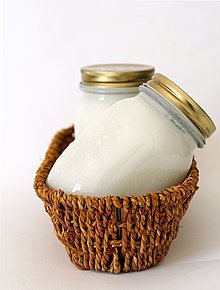Shortening

Shortening is a semisolid fat used in food preparation, especially baked goods, and is so called because it promotes a "short" or crumbly texture (as in shortbread). The term "shortening" can be used more broadly to apply to any fat that is used for baking and which is solid at room temperature, such as butter, lard, or margarine, but as used in recipes it refers to a hydrogenated vegetable oil that is solid at room temperature. Shortening has a higher smoke point than butter and margarine, and it has 100% fat content, compared to about 80% for butter and margarine.
Although the term has been in use for many years, it is now known that shortening works by inhibiting the formation of long protein (gluten) strands in wheat-based doughs. The similarity in terms is entirely coincidental since full understanding of the structure and chemistry of dough is comparatively recent.
History

Crisco, a popular brand in the USA, was first produced in 1911. In Ireland and the UK Cookeen is a popular brand. An industrial product, shortening has many advantages. While similar to butter or lard, it is cheaper to produce; originally, lard was far cheaper and edible oils came at a higher cost. Shortening also needs no refrigeration, which further lowers its costs and increases its convenience. As a substitute for butter, it can lengthen the shelf life of baked goods and other foods. With these advantages shortening gained popularity, as food production became increasingly industrialised and manufacturers sought low-cost raw materials. Vast surpluses of cottonseed oil, corn oil, and soy beans helped found a market in low-cost shortening.
Health concerns and reformulation
Available and used worldwide, vegetable shortening is believed to be damaging to human health since, it generally contains trans fats in the form of partially hydrogenated vegetable oil. After the oils are hydrogenated, they become solid at room temperature, but the type of trans fat generated in this process has adverse health effects. Usage of shortening lacking trans fats has grown, notably with the 2007 reformulation of Crisco such that it contains less than 1g of trans fat per 12g serving. Cookeen was also reformulated in autumn 2006 to remove trans fats[1].
References
- ^ The Guardian: Grease is the Word, Guardian Unlimited, 27 September 2006
Bibliography
- William Shurtleff and Akiko Aoyagi, 2007. "History of Soy Oil Shortening: A Special Report on The History of Soy Oil, Soybean Meal, & Modern Soy Protein Products," from the unpublished manuscript, History of Soybeans and Soy foods: 1100 B.C. to the 1980s. Lafayette, CA (US): Soyinfo Center.[1]
